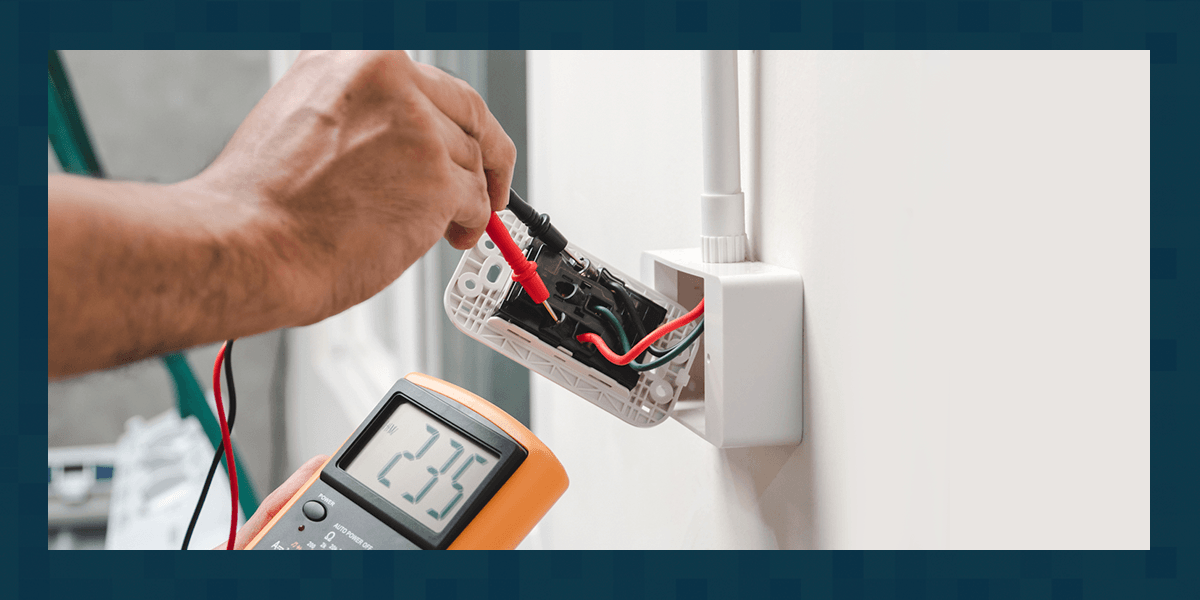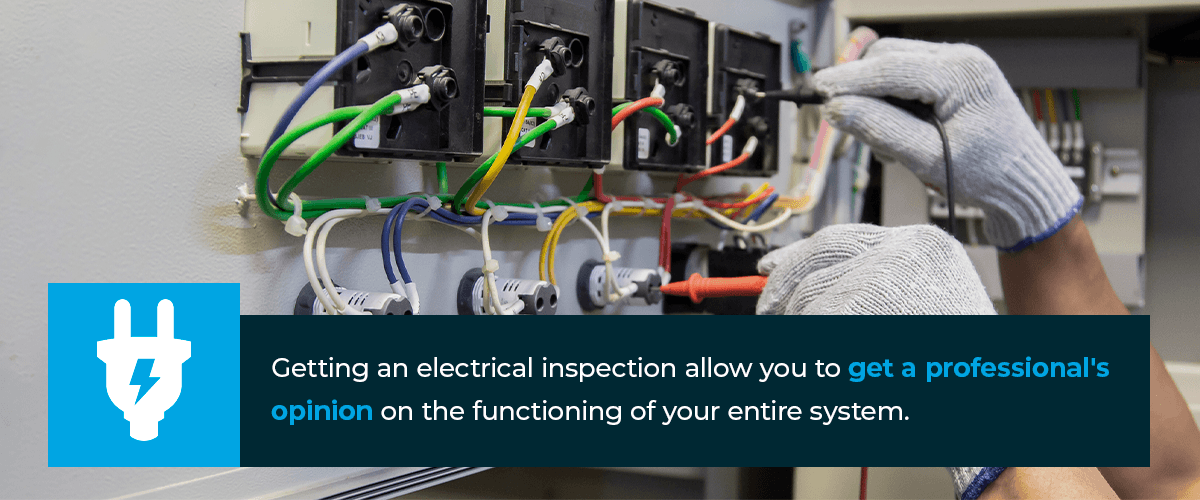Importance of Electrical Inspections
Flipping a breaker or tightening an outlet cover may be a quick fix, but a professional should be the only one performing electrical work and repairs. Many dangers come with a malfunctioning electrical system, but regular inspections are the best way to detect and prevent issues before they become a problem.
Learn about the importance of electrical inspections and how to know when you need one.
Why Are Electrical Inspections Important?
Electrical systems are essential to your home and business. Problems with your electric system can be more than just an inconvenience — they can be dangerous to the inhabitants and the structure itself. Most property owners only think about an electrical inspection when they are in the market to buy or sell, but electrical safety inspections are an important part of property upkeep.
Getting an electrical inspection is a key step in maintaining your home or business. Responding to problems only when they become noticeable can mean playing constant catch-up with your electrical maintenance, costing you expensive servicing fees and potentially putting you in danger. Electrical inspections allow you to get a professional’s opinion on the functioning of your entire system. They’ll notify you of current problems and give you guidance on possible issues that may develop in the future.
Common Electrical Problems
To understand why electrical inspections are so crucial, learn about some of the most common electrical dangers:
- Outdated or bad wiring: Older buildings may have great charm, but outdated wiring is a big electric hazard. Old or damaged wiring can lead to power surges, arc faults and fires. According to the National Fire Protection Association (NFPA), electrical wiring was responsible for 4% of all home fires between 2019 and 2023.
- Overloaded circuits: A circuit can safely handle a set electric load. If you’re using more than that, you might see signs of tripped breakers, dimming or flickering lights or heat coming from the outlets. Overloaded circuits can cause damage to devices plugged into them, but also pose a significant fire risk.
- Extension cords: Extension cords come with a host of potential dangers — overloaded outlets, frayed cords and using cords not rated for the appliance, to name just a few. If you are using too many extension cords, you likely need more outlets installed on your property.
- Water dangers: Water and electricity do not mix and can lead to electrocution. Install ground fault circuit interrupter (GFCI) outlets in areas where there is a chance an electrical appliance will come in contact with water.
- Appliances: Keeping appliances plugged in all the time can use electricity, even when they’re not in use. This can lead to overheating and damage from power surges.
Electrical Risks in Homes
Some dangers are unique to home environments, so consider these reasons why you need a home electrical inspection:
- Poor DIY work: Electrical work can be dangerous, and poor do-it-yourself (DIY) fixes may not follow the proper codes and pose a risk to inhabitants.
- Pets and children: Homes with pets or children should include extra precautions to protect against electrical hazards. Ensure all outlets have proper covers, and keep electrical devices out of reach of small hands, paws and teeth.
- Lighting: Changing a lightbulb should be a pretty simple task, but there are some important nuances to lighting many aren’t aware of. For example, a bulb with too high wattage could overload the fixture’s wiring.
Electrical Risks in Commercial Properties
Business and commercial property owners should look out for these risks:
- Damaged tools or equipment: Equipment and tools that are outdated or damaged can cause shock or electrocution unless handled by someone with proper training. Ensure all workers practice proper lock-out tag-out (LOTO) procedures during maintenance and repairs.
- Improper grounding: Grounding offers a sort of back up protection in the case of excess electricity channels from a device. Removing or improperly installing grounding can cause electrocution or fires.
- Code violations: Commercial properties must comply with electrical and fire codes to ensure safe occupancy. Common electrical code violations include cluttered breakers, faulty wiring and insufficient electrical bonding.
How to Know if You Need an Electrical Inspection
An electrical inspection is likely required if you:
- Find yourself relying on extension cords for appliances and devices
- Detect a strange smell from an outlet
- Notice your lights are flickering or dimming
- Need to reset the breaker often due to frequent tripping or blown fuses
- Have outlets in a garage, kitchen or bathroom area that is not a GFCI outlet
If you notice a burning smell from the breaker, feel heat coming from the outlets or see sparking from the outlets or fuse box, contact an electrician as soon as possible for repairs.
An electrical inspection should be a part of your regular home or business maintenance plan. Homeowners should schedule an inspection every few years to ensure everything is working and catch issues before they become a danger.
Businesses, especially those with large machinery and heavy electrical requirements, should plan for annual electrical inspections. This helps keep workers and equipment safe and can prevent costly code violations that lead to fines and halted operations.
5 Reasons to Hire a Professional Electrician
A professional electrician should be the only one to perform repairs or maintenance on your electrical system. The benefits of hiring a professional for your electrical safety inspection include:
- Protecting the lives of inhabitants: Put your family or building inhabitants in good hands by hiring an experienced technician to take care of your electrical work. Someone with the right experience and knowledge will know what to check and can identify problems before they become a danger to life.
- Extending the life of your equipment: Electrical issues may fry components and damage appliances and equipment. Professional electrical inspections can prolong the life of your investments.
- Maintaining compliance: The consequences of failing to follow proper regulations and codes can be steep, so hire a professional for all your electrical work to avoid a failed audit.
- Expert advice: If you’re planning renovations or considering a redesign, an electrician can offer expert advice about your unique situation.
- Advanced equipment: Electrical contractors have access to better equipment for detecting and identifying issues.
Rely on idcAutomatic’s Electrical Inspection Services
Now that you understand the importance of an electrical inspection for your home or business, consider inspection services from idcAutomatic. Our technicians will review your property using our decades of experience and industry expertise to create a safer and more secure environment. With the help of our advanced thermal imaging capabilities, we can quickly and efficiently identify issues.
We also offer a comprehensive list of electrical work, including electrical installation and smart home automation. Reach out for a quote to learn more about our services and how we can protect your home or business.


